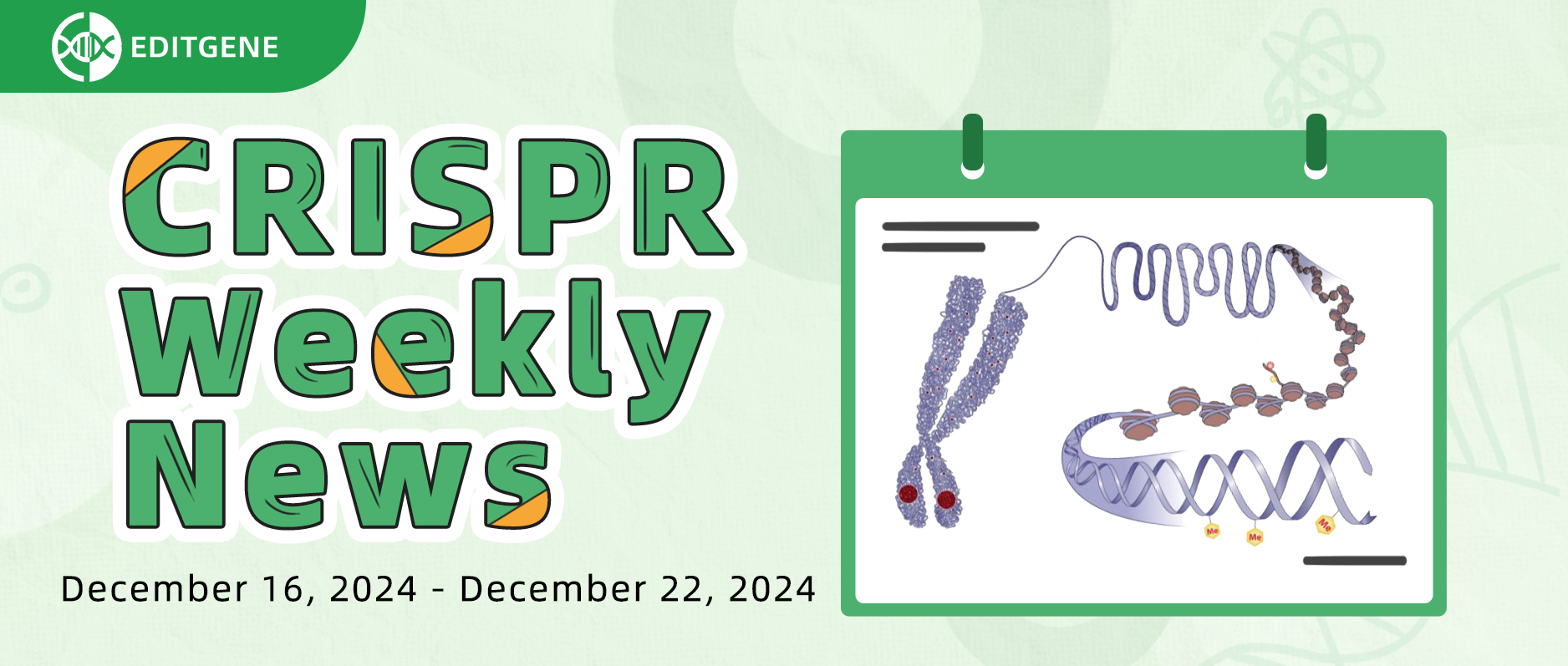[Weekly News] CRISPR-StAR: High-Resolution Genetic Screening Innovation
CRISPR/Cas9

CRISPR/Cas technology is a revolutionary tool in modern biological sciences, with applications spanning medicine, agriculture, environmental conservation, and more. New findings and case studies continue to emerge across these fields. Our‘CRISPR Weekly News’column brings you the latest research and industry updates. Here's a brief summary of the past week's highlights:
I. Research Updates
1. Title: CRISPR-StAR enables high-resolution genetic screening in complex in vivo models
Journal: nature biotechnology (Impact Factor: 33.1)
Original Link:https://doi.org/10.1038/s41587-024-02512-9
Austrian scientists recently introduced CRISPR-StAR, a novel screening technology, in Nature Biotechnology. This method addresses the challenges of genetic screening in complex in vivo models by using internal controls and single-cell level analysis. CRISPR-StAR reduces noise from heterogeneous growth environments and bottlenecks, enabling the reliable identification of genetic dependencies across different tumor environments. Benchmarking against traditional screening methods demonstrated improved data quality with this technology.
2. Title: Identification and Therapeutic Targeting of METTL8-Mediated Lenvatinib Resistance in Hepatocellular Carcinoma Using Rabdosiin
Journal: Experimental Cell Research (Impact Factor: 3.3)
Original Link:https://doi.org/10.1016/j.yexcr.2024.114389
In hepatocellular carcinoma (HCC), lenvatinib is a key first-line treatment, but resistance remains a major challenge. Researchers from China conducted genome-wide CRISPR-Cas9 screening in HCC cell lines to identify key molecular factors driving lenvatinib resistance. They identified METTL8 as a critical gene responsible for this resistance. Further compound screening revealed Rabdosiin as an effective METTL8 inhibitor capable of overcoming lenvatinib resistance. The study suggests METTL8 as a therapeutic target and biomarker for enhancing lenvatinib efficacy in HCC patients.
1.Title: CRISPR-Cas12a bends DNA to destabilize base pairs during target interrogation
Journal: Nucleic Acids Research (Impact Factor: 16.7)
Original Link:https://doi.org/10.1093/nar/gkae1192
A recent study led by renowned scientist Jennifer Doudna reveals how Cas12a initiates DNA target recognition. Through structural and biochemical analyses, the researchers discovered that Cas12a bends the DNA, causing temporary nucleotide flipping, which exposes them for complementary pairing with crRNA. Using cryo-electron microscopy imaging and fluorescence techniques, they demonstrated that this DNA destabilization is critical for target identification and binding. The findings highlight that RNA-guided DNA interference typically begins with CRISPR-Cas proteins temporarily binding and distorting the DNA helical structure.
2.Title: CRISPR/Cas12a-Enabled Amplification-Free Colorimetric Visual Sensing Strategy for Point-of-Care Diagnostics of Biomarkers
Journal: Analytical Chemistry (Impact Factor: 6.8)
Original Link:https://doi.org/10.1021/acs.analchem.4c06196
Researchers from China developed a novel colorimetric biosensing strategy based on CRISPR/Cas12a for rapid biomarker detection. Unlike most CRISPR/Cas12a biosensors that use fluorescence systems as reporter probes, this approach generates strong visual signals through horseradish peroxidase (HRP)-mediated etching of gold nanobipyramids (AuNBPs) in the presence of hydrogen peroxide and 3,3',5,5'-tetramethylbenzidine. When the target biomarker is present, the trans-cleavage activity of CRISPR-Cas12a is activated, releasing HRP from the reporter probe. The practicality of the sensor was validated using BRCA1 as the target biomarker, achieving a detection sensitivity of 30 pM and a detection time of under 60 minutes.
iii. Other CRISPR-Related Research
1. Title: NIS-Seq enables cell-type-agnostic optical perturbation screening
Journal: Nature Biotechnology (Impact Factor: 33.1)
Original Link:https://doi.org/10.1038/s41587-024-02516-5
Optical pooled screening uses fluorescence microscopy for large-scale analysis of cellular phenotypes but is limited by its reliance on cytoplasmic transcripts. A team of researchers in Germany introduced nuclear in situ sequencing (NIS-Seq) as a solution to this challenge. NIS-Seq generates bright sequencing signals directly from nuclear genomic DNA, using an inverted bacteriophage promoter downstream of sgRNA to produce multiple RNA copies independent of cellular transcription. The researchers demonstrated the versatility of NIS-Seq across eight cell types from two species, enabling genome-scale screening to identify key regulators of inflammatory pathways.
2. Title: Principles of CRISPR-Cas13 mismatch intolerance enable selective silencing of point-mutated oncogenic RNA with single-base precision
Journal: Science Advances (Impact Factor: 11.7)
Original Link:https://doi.org/10.1126/sciadv.adl0731
CRISPR-Cas13 can target oncogenic RNA, but its mismatch tolerance often prevents single-base precision. Researchers at the Peter MacCallum Cancer Centre in Australia strategically introduced synthetic mismatches into spacer sequences to design crRNAs capable of selectively silencing point-mutated transcripts while sparing wild-type sequences. This method successfully targeted oncogenic mutations such as KRAS G12, NRAS G12D, and BRAF V600E. Additionally, these SNV-selective crRNAs reduced off-target activity of RfxCas13d. The study highlights how CRISPR-Cas13 can be reprogrammed for single-nucleotide precision, paving the way for personalized transcriptome editing in cancer therapy.
3. Title: Islands of genomic stability in the face of genetically unstable metastatic cancer
Journal: PLOS One (Impact Factor: 2.9)
Original Link:https://doi.org/10.1371/journal.pone.0298490
Metastatic cancer is the leading cause of cancer-related deaths, with varying success rates of current treatments and five-year survival rates below 5% in some cases. Researchers in the United States developed a potential genetic targeting approach for metastatic cancer by utilizing naturally occurring mutations to create CRISPR-Cas9 targetable PAM sites. Whole-genome sequencing of primary and metastatic pancreatic tumors revealed that 90% of PAM targets were retained across tumor sites. Importantly, PAM sites in regions of loss of heterozygosity (LOH) in primary tumors remained stable in metastases, whereas those in heterozygous regions were often lost. This suggests that CRISPR-based therapies targeting trunk LOH regions could be a promising strategy for treating metastatic pancreatic cancer.
II. Industry News
1. Arbor Biotechnologies announced yesterday that the FDA has approved the IND application for ABO-101, a novel gene-editing therapy designed as a one-time treatment for primary hyperoxaluria type 1 (PH1). The therapy works by permanently disabling the HAO1 gene in the liver, reducing PH1-associated oxalate production. The Phase 1/2 redePHine trial will evaluate the safety, tolerability, pharmacokinetics, pharmacodynamics, and preliminary efficacy of ABO-101 in adult and pediatric PH1 patients. ABO-101 consists of lipid nanoparticles licensed from Acuitas Therapeutics, encapsulating mRNA encoding a novel Type V CRISPR-Cas12i2 nuclease and optimized guide RNAs targeting the human HAO1 gene.
Read more
2. Precision Biosciences announced earlier this week that it has received clinical trial application approval in Hong Kong to study PBGENE-HBV in its ongoing Phase 1 ELIMINATE-B trial. PBGENE-HBV, Precision’s lead wholly-owned in vivo gene-editing program, aims to cure chronic hepatitis B by eliminating cccDNA, the key source of HBV replication, and inactivating integrated HBV DNA in hepatocytes. According to the press release, Precision is actively recruiting patients for the ELIMINATE-B trial in Moldova and has started operations at top infectious disease clinical sites in Hong Kong as part of its global regulatory and clinical strategy.
EDITGENE focuses on CRISPR technology,offering a range of high-quality gene editing services and in vitro diagnostic products. These include but are not limited to:CRISPR Library Screening,Cell Line Engineering,Monoclonal Cell Line Screening,CRISPR Detection. We are committed to providing the most efficient technical services for CRISPR-related,gene function research,in vitro diagnostics,and therapeutic research.
Recent Blogs
1. [Weekly News]CRISPR screening reveals synthetic lethal interactions in cancer, providing new targets for therapy
2. [Literature Review] CRISPR gene editing combined with magnetocaloric activation: A new strategy to assist precision medicine in cancer
3. [Weekly News] Multiplexed CRISPR Arrayed Libraries: Advancing Whole-Genome Targeting for Knockout, Activation, and Silencing Research
Follow us on social media
Contact us
+ 833-226-3234 (USA Toll-free)
+1-224-345-1927 (USA)
info@editxor.com












![[Weekly News] CRISPR-StAR: High-Resolution Genetic Screening Innovation](/uploads/20241227/PskyIJUXv5c6emGa_ce9a01bd08f9d18c7d09fad585bc559f.jpg)

Comment (4)